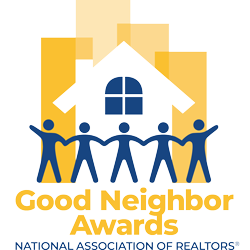2021 Good Neighbor Awards Winner
A decade ago, REALTOR® Christina Sauger owned a big house, and her door was open to anyone for a cup of coffee, a sympathetic ear, or a bed to sleep in. Sunday dinners were the highlight of the week. That’s when she invited friends and strangers alike to enjoy a home-cooked meal and a few hours of camaraderie. Leftovers were boxed up for sick neighbors.
“It wasn’t just about food; it was about making connections and building community with one another,” says Sauger, a longtime resident of Safety Harbor, Fla., and a sales associate with Charles Rutenberg Realty in Clearwater.
Sauger dreamed of bringing larger numbers of people together through food. As she researched the possibilities, she learned that about 14% of households in the country are considered food insecure, according to the U.S. Department of Agriculture. She also heard about “One World Everybody Eats,” a network of pay-what-you-can community cafes, and she embarked on a road trip to visit several.
Inspired by the concept of nourishing body and soul, she created the nonprofit Harbor Dish in 2013 and has served as its unpaid executive director ever since.
“We aren’t just filling the need of hunger. We are filling the need of human interaction and human communication.” —Christina Sauger
“Our premise is that everyone eats the same meal regardless of their means to pay,” she says. “Everyone is treated with dignity and respect. We don’t qualify anyone.”
Without a brick-and-mortar site, the Harbor Dish is a mobile operation with multipronged programming. A retinue of volunteers, including professional chefs, cook and deliver hundreds of healthful, microwavable meals to residential facilities for foster children and domestic violence survivors, homes of seniors, and ESL classrooms. They also host large-scale outdoor dinners for the public and pop-up events throughout the city.
A Sharing Community
The food Harbor Dish uses is donated by grocery stores like Whole Foods, restaurants, and farmers. One church provides storage space, and another church shares its commercial kitchen.
“We pick it up, we keep what we can use, and deliver the rest to other nonprofits,” says Sauger, who volunteers 40 hours a week and often reaches into her own pocket to cover expenses, especially as the need increased in 2020. “I had many sleepless nights but the need to help people kept me going,” recalls Sauger. “I also had the best year of sales in almost 30 years in real estate. The more I gave, the more I received.”
Safety Harbor Mayor Joe Ayoub praises Sauger’s dedication and service to the city and its residents.
“There are always people, even before the pandemic, who are struggling, whether they lose a job or meet unfortunate circumstances, and they just need a little bit of help,” Ayoub says. “Christina has a great heart, and she puts other people’s needs before her own. We are lucky to have her.”
“As a REALTOR®, I know everyone,” says Sauger. “When people need something, I usually know where to refer them.”
Facing Down COVID-19
When COVID-19 shut down much of the world, including the Harbor Dish community dinners, Sauger and her team strategized and regrouped. Volunteer numbers were down due to fears of contracting the virus, but the food donations—which were needed more than ever—kept pouring in.
“We were not only able to continue during the pandemic, but we actually quadrupled the amount of food we distributed.” —Christina Sauger
A pandemic relief grant enabled them to purchase personal protective equipment for willing volunteers, mountains of to-go containers, and additional cooking equipment. With those items in hand, they launched the home delivery program, which continues today.
In 2020, they distributed 200,000 pounds of food, which equates to 167,000 meals—four times the prior year.
Yolanda Schneider, 91, is a regular on Sauger’s list of deliveries. Schneider lives alone in an apartment complex, where social activities were canceled during the worst of the pandemic.
“She’s such a great lady,” Schneider says of Sauger. “Before the vaccines, she came with her mask on, and I had my mask on. This way, I don’t have to go out as much or carry as much stuff. I could never thank her enough for going out of her way to make sure I am eating.”
Between deliveries, Sauger calls regularly to chitchat, she adds.
Making Connections
By spring, the community dinners were back on the agenda. On the third Friday of every month, the team puts out a spread in a parking lot on Main Street. One recent menu consisted of pork roast with port wine sauce, a baked potato, and broccoli-cauliflower au gratin. Some people pay the suggested donation amount, some don’t, and some pay for more meals than they take. No questions are asked. Diners are invited to the communal table, which is where Sauger is likely to be.
“We want people to get to know each other,” she says. “If someone sits down to share a meal and tells people ‘I need a job,’ chances are someone is going to know someone who is hiring.”
Harbor Dish also participates in monthly street festivals at the Safety Harbor Museum and Cultural Center by bringing food related to the theme of the event, like lasagna for Italian Night. Their appearances draw people “who didn’t know the museum is here, and they stay to learn about the culture we are bringing in,” says the city’s Recreation Supervisor Christine McWilliams. “It’s a win-win for us.”
Ultimately, Sauger longs for a permanent location for a cafe, but that’s an expensive reach for the grassroots organization on a shoestring budget. A more immediate need is a reliable transport vehicle for pickups and deliveries to replace the current run-down SUV with the “check engine” light on.
“The work is exhausting, but I wouldn’t trade it for anything,” Sauger says. “I love the fact we are making a difference in people’s lives.”
Contact Sauger at chrissaugerrealtor@gmail.com and learn more at www.HarborDish.org.







